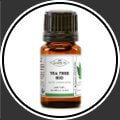Having beautiful hair has always been synonymous with femininity or virility. Hair has indeed been at the service of seduction since the dawn of time, it is also an important part of the body for self-esteem.
We are not all equal when it comes to hair loss. Men are more affected by this phenomenon than women, just as older people are more affected than young people. Many genetic, hormonal and environmental factors can cause it.
How to detect incipient alopecia? What factors play a major role? And above all, what are the causes over which we have power to act? In this file we answer all these questions, you will also discover our advice and tips as well as our recipes based on essential oils to help you naturally fight against excessive hair loss.


Strengthening and anti-hair loss hair spray with essential oils
Why we love it: this two-phase spray for daily use strengthens, smoothes, nourishes hair and regulates sebum production. Rosemary and cade essential oils help limit hair loss. Not very greasy, this spray does not need to be rinsed. Use without moderation for healthy hair.
Ingredients :
- 15 drops ofrosemary essential oil with cineole
- 10 drops ofcade essential oil
- 70 ml d'clary sage hydrosol
- 10 ml d'mustard oil
- 10 ml d'hemp oil
Preparation: mix all the ingredients in a 100 ml bottle fitted with a spray bottle then shake well to homogenize the preparation. Please note, this spray is two-phase, so it is completely normal for the 2 phases (oil and water) to separate quickly after mixing.
How to use it :
shake before each use. Spray quickly all over hair and scalp. Massage to make the preparation penetrate. There is no need to rinse.Precaution: do not use in pregnant or breastfeeding women and children under 8 years old.

Treatment with essential oils to promote hair growth and slow down hair loss
Why we love it: this concentrate of powerful active ingredients fights against alopecia, promotes hair growth and reduces hair loss. Use only on bare areas!
Ingredients :
- 40 drops ofrosemary essential oil with cineole
- 20 drops ofcade essential oil
- 20 drops ofBay Saint Thomas essential oil
- 30 ml of 70° alcohol
- 12 ml of glycerin
- 50 ml of sterilized water
Preparation: dilute the essential oils in alcohol. Then dilute the glycerin in the sterilized water in a 100 ml bottle with a measuring cap. When the 2 mixtures are homogeneous, add the “essential oils-alcohol” mixture to the contents of the bottle. Shake to homogenize the preparation.
How to use it :
apply, using the dispenser, a few drops of this mixture to bald areas. No need to massage, this synergy evaporates quite quickly. Apply daily to the affected areas. Shake before each use.Precaution: do not use in pregnant or breastfeeding women and children under 12 years old. Be careful, alcohol can dry out the scalp and irritate the skin. Do not use in case of sensitive scalp. Stop use if redness or persistent dryness occurs.

Strengthening and anti-hair loss shampoo with essential oils
Why we love it: invigorating and anti-dandruff, the essential oils of rosemary, cineole and Bay Saint Thomas strengthen the hair, cleanse the scalp and help fight hair loss.
Ingredients :
- 1 drop ofrosemary essential oil with cineole
- 1 drop ofBay Saint Thomas essential oil
- Your usual dose of shampoo
Preparation: add 1 drop of each essential oil to your usual dose of shampoo. Mix in your hands then wash your hair as usual.
How to use it :
after adding essential oils, your shampoo is used like a classic shampoo. Rinse after use. This synergy is not suitable for daily use. If you wash your hair every day, it is best to alternate with a dose of shampoo without essential oils.Precaution: do not use in pregnant or breastfeeding women and children under 12 years old. Do not contact eyes. If you have a very sensitive scalp, it is advisable to use this synergy maximum 1-2 times a week and alternate with a dose of shampoo without essential oils.

Soothing and cleansing local treatment with essential oils for scalp eczema
Why we love it: chronic eczema of the scalp causes dandruff, scales, tickles and hinders proper hair growth. Anti-inflammatory, healing and soothing, this synergy reduces redness and itching linked to scalp eczema. It also reduces dandruff and flaking, cleanses the scalp and thus helps limit hair loss.
Ingredients :
- 8 ml d'hemp vegetable oil
- 15 drops ofVirginia cedar essential oil
- 15 drops ofRoman chamomile essential oil
- 15 drops ofaspic lavender essential oil
Preparation: mix all the ingredients in a 10 ml dropper bottle, shake it well to homogenize the preparation. It's ready !
How to use it :
apply a few drops of the synergy to eczema patches in the evening before bed. Massage gently to make the preparation penetrate. In the morning, use a gentle shampoo.Precaution: do not use in pregnant or breastfeeding women and children under 12 years old. Do not use more than 10 days in a row.
Contraindications:
Essential oils are generally not recommended for pregnant women (during the entire pregnancy), breastfeeding women and children under 8 years old (12 years old for certain essential oils). Carefully read the contraindications for each essential oil.
These properties and methods of use do not constitute medical advice. For therapeutic use consult a doctor.

Is your hair loss normal or excessive?
Hair loss is a completely normal phenomenon since hair has a limited lifespan. Once they fall out, they leave room for new hair to grow. We lose on average between 50 and 100 hairs daily, even more at the change of season. Losing hair when brushing or drying is therefore completely physiological!
But how can you tell the difference between natural hair loss and abnormal and excessive hair loss?
If you pull out a hair, there should be a small white ball at its root: this is the hair bulb. If this bulb is white, it means that the hair is regenerating naturally. If, on the other hand, you do not see a bulb, it is possible that no new hair is growing in place of the one that has just fallen out. This is a first sign of abnormal hair loss.
Significant hair loss in the shower or on the pillow should also alert you. It is normal to lose hair when drying or brushing, but your bathroom floor should not be full of them.

What is alopecia?
Alopecia is a general term for excessive hair loss regardless of the cause. It can be simply due to age or induced by genetic or pathological factors. It results in loss of part or all of the hair (and body hair in certain cases).
If the alopecia is significant, baldness (absence of hair on certain parts of the skull) may then appear. This term is most often reserved for men whose scalp is gradually balding.
This excessive hair loss can have a significant impact, both physical and psychological, and should therefore not be taken lightly. Women and children are the most psychologically impacted because alopecia is less commonly accepted among them.
Before starting treatment, it is essential to determine the cause of baldness. Indeed, many natural active ingredients (including essential oils) will be indicated to strengthen hair or reduce hair loss, but the most effective is and will always remain, to identify the cause.
The best essential oils against hair loss
When underlying pathologies, deficiencies or medicinal causes have been ruled out, many natural remedies and essential oils can be used to reduce hair loss and strengthen hair.
The most effective are the following essential oils:

Bay Saint Thomas essential oil (Pimenta racemosa):
Properties: Bay Saint Thomas essential oil is an excellent hair tonic. When used locally, it activates the blood supply to the scalp and helps reduce hair loss. It reduces the appearance of dandruff and promotes hair growth. Slightly astringent, it helps regulate sebum production and therefore fights against oily hair and scalp.
Uses: always used locally, it can be included in shampoos, pre-shampoo treatments, conditioners, masks and oils. A drop of this essential oil can be added to the dose of shampoo. Do not use daily, prefer 1 to 2 times a week maximum.
Precautions: dermocaustic for local use, it must always be strongly diluted. (1 drop of essential oil for 10 drops of vegetable oil or shampoo). Do not use in pregnant or breastfeeding women, children under 12 years of age, epileptic people, the elderly, hypertensive people or in cases of hormone-dependent pathology or mastosis.

Cineole rosemary essential oil (Rosmarinus officinalis CT cineole):
Properties: known for its respiratory decongestant and anti-infectious properties, cineole rosemary is also the essential oil for hair. Tonic and anti-dandruff, it is frequently used in “ready-made” shampoos to combat oily hair, cleanse the scalp and combat hair loss. It is also ideal for fine, fragile and dull hair, to which it restores vigor and shine.
Uses: safer to use than Bay Saint Thomas and Cade, do not hesitate to add a drop of rosemary cineole essential oil to your daily dose of shampoo!
Precautions: do not use in pregnant or breastfeeding women, children under 8 years old, epileptic, elderly or hypertensive people. Rosemary cineole essential oil is slightly dermocaustic but can be used daily as long as it is diluted. Do not confuse rosemary cineole essential oil with those of rosemary camphor or verbenone. These 3 essential oils have very different chemotypes and properties.

Cade essential oil (Juniperus oxycedrus):
Properties: this is one of the best allies for oily and dull hair and scalp. This powerful essential oil fights against excessive sebum production and helps with dandruff and scalp dermatosis (often responsible for increased hair loss). An excellent parasiticide, it also helps get rid of lice!
Uses: in case of dandruff or dermatosis of the scalp (often responsible for increased hair loss), dilute 5 drops of cade essential oil in 15 drops of a neutral, dry vegetable oil such as jojoba. Apply in the evening to the most affected areas of the scalp. Do not apply for more than 5 days in a row.
Precautions: do not use in pregnant or breastfeeding women, children under 8 years old, or in cases of hormone-dependent pathologies or mastosis. Cade is an excellent alternative to Bay Saint Thomas essential oil, just as powerful but safer and above all less dermocaustic.

Virginia cedar essential oil (Juniperus virginiana):
Properties: Virginia cedar essential oil is anti-dandruff and regulating. Very useful in cases of oily hair and dandruff, its action does not stop there. Frequently used to stimulate blood circulation, this essential oil will improve irrigation of the scalp to promote growth and reduce hair loss.
Uses: in synergy with lemon, cade or cineole rosemary essential oil. Use 10 drops of Virginia cedar essential oil mixed with 20 drops of lemon essential oil. Add 1 drop of this synergy to your daily dose of shampoo to cleanse the scalp and add shine to dull hair.
Precautions: do not use in pregnant or breastfeeding women, children under 12 years old, people with epilepsy, in cases of kidney disease, hormone-dependent or mastosis. Well tolerated for cutaneous use, its oral or oral use must be supervised by a health professional.
Vegetable oils for hair beauty
Strictly speaking, there are no anti-hair loss vegetable oils. They will have to be combined with essential oils to obtain a real effect against alopecia. However, all of these vegetable oils each have specific properties for beauty and hair care. Here's something to help you make a choice!

Argan Oil :
Properties: anti-aging beauty oil par excellence, argan oil has been used by the populations of the Atlas for centuries. Firming and anti-wrinkle for the skin, it is also a hair oil of choice to strengthen and give shine to dull, fine and fragile hair. Protective, it helps protect the skin and hair against climatic aggressions (cold, wind, sun). Argan oil is also known to strengthen brittle nails.

Castor oil :
Properties: so special due to its thick texture and very high viscosity, castor oil is almost irreplaceable in the care of hair, brittle nails, eyelashes and eyebrows. Apply castor oil to your eyelashes and eyebrows every evening using a previously cleaned mascara brush to strengthen them. In nail and cuticle care, it combines with lemon essential oil to lighten and make nails shine. In hair care, always combine it with other vegetable oils (10-20% castor oil in 80-90% other vegetable oils) to improve the texture of your masks, oil baths and shampoos. . Always rinse after use to avoid a rather unpleasant sticky effect.

Hemp oil:
Properties: perfect for dull hair, hemp oil is also ideal for difficult-to-manage hair. Toning and smoothing, it combines wonderfully with broccoli oil in a hair conditioner or a treatment oil. Nourishing, it nevertheless penetrates easily into the skin and hair sheath and leaves little greasy film. It will combine perfectly with a dry oil like jojoba (and essential oils: bay Saint Thomas and cineole rosemary) to make an anti-hair loss serum or with a more nourishing oil like castor (in small quantities) for a mask before shampoo.

Broccoli oil:
Properties: this oil, little known to the general public, is a hair conditioner in itself! Fortifying and nourishing, it gives volume, sheaths and detangles all types of hair. It is added to liquid or solid shampoos to add shine to dull hair and to conditioners to detangle and add volume. This anti-frizz oil is an ideal complement for straightening and conditioning frizzy, curly or frizzy hair.

Mustard oil:
Properties: this toning and strengthening hair oil is known to help slow hair loss and promote hair growth. Anti-dandruff, it is also nourishing and conditioning. This powerful vegetable oil will not be used alone. In fact, it is recommended to include it in a preparation containing other fatty substances (vegetable oils for example) because its “heating” effect can surprise many people if it is used alone! Mustard oil is also used as a warming massage oil for athletes or to soothe painful muscles after exercise.

What causes alopecia (hair loss)?
Excessive hair loss has different meanings for men and women. They will need to be handled differently. Here is a non-exhaustive overview of the possible causes of alopecia.
- In humans: genetic and hormonal factors must be considered. Some men are more affected by alopecia than others and the hereditary factor is very important. In fact, you will be much more likely to go bald if your father and grandfather were bald before you. Furthermore, the most common alopecia in men is what we call androgenic alopecia, due to male hormones. This type of alopecia is banal and very common. It affects on average one in two men around the age of 50!
- In women: alopecia can be multifactorial and the origin is much more difficult to determine than in men. Hormonal factors should be considered: female hormones play a rather protective role (compared to male hormones) even if hormonal disruption can be the cause of transient alopecia (menstruation, puberty, menopause). Additionally, some women suffer from hyperandrogenism. This more or less pathological excess of male hormones will also be the cause of diffuse hair loss in women. Alopecia can also be due to a seasonal factor. More significant hair loss is observed in autumn and spring. During the first half of pregnancy, increased hair loss is possible as well as one month after delivery. Finally, lack of iron can be the cause: menstruation, an unbalanced diet, multiple pregnancies are all causes of iron deficiency in a healthy woman.
- In children: alopecia in a child should always be the subject of a medical consultation. Indeed, excessive hair loss in a child is, most often, a symptom of an underlying local or systemic pathology.

The causes of alopecia in general
Certain more general causes can induce alopecia in both men and women:
- Lack of vitamins, minerals and trace elements. A lack of iron or anemia can cause excessive hair loss. A poor diet or following a too strict diet can be the source of deficiencies in iron, B vitamins and zinc, necessary to maintain healthy hair and nails.
- Alcohol and tobacco also negatively influence the growth of hair and nails and weaken the integuments (more general name given to hair and nails).
- Stress, depression or chronic fatigue are all factors that can alter hair quality. However, even intense stress will only play a minor role in hair loss. In the event of significant alopecia, stress cannot be the only cause and another diagnosis must be established.
- Chronic eczema and dermatoses localized on the scalp can hinder proper hair growth and weaken hair bulbs. The itching they cause induces scratching lesions, which are not conducive to optimal growth.
- Certain systemic diseases: cancers, autoimmune diseases, etc. It is important to rule out any systemic cause before symptomatic treatment of even minor alopecia.
- Traction alopecia: this alopecia is caused by too much and too frequent traction on the hair. Mats, elastics, barrettes, regular straightening, reduce the vascularization of the hair bulb and weaken the hair.
Other causes can also cause alopecia.
- Thyroid problems: hypo or hyperthyroidism can be the cause of excessive hair loss.
- Drug treatments (oral contraceptives when the dose or active ingredient is not appropriate, certain antiepileptics or antihypertensives, chemotherapy, etc.). Be careful, it is essential to never stop medication treatment without medical advice. Talk to your doctor to find the combination that will be most appropriate while reducing side effects.
- Ringworm or alopecia areata

Our advice for slowing down hair loss on a daily basis
- Do not hesitate to wash your hair with a mild shampoo. This type of shampoo does not weaken the hair very much and will not increase hair loss.
- Avoid at all costs hair dryers that are too hot as well as heated helmets. Heat is a recognized aggravating factor in hair loss. In summer, opt for drying your hair naturally, in the open air.
- Even if you are a fan of hot showers, prefer lukewarm water to rinse your hair.
- Be careful of traction! Braids that are too tight, elastics and barrettes, regular straightening are all factors that do not improve incipient alopecia.
- Reduce the frequency of coloring, bleaching and highlighting: these chemical treatments damage the hair bulb and slow down growth.
- Make sure you eat a balanced diet: colorful vegetables and fruits for optimal vitamin intake.
- Get regular sleep and reduce stress. Even though stress only plays a minor role in alopecia, it is harmful in many circumstances! High blood pressure, tachycardia, tension headaches, non-restorative sleep are all consequences of too much stress.
- Avoid tobacco.
Bibliography
- Baudoux D Practical aromatherapy notebooks according to the French school Vol. 1 Pediatrics, Vol. 2 dermatology and Vol. 5 pregnancy. Collection: Aromatherapy professionally. 2011 edition
- Baudoux D and Breda ML Chemotyped essential oils. Scientific aromatherapy. Ed. JOM 2015
- Baudoux D Practical guide to family and scientific aromatherapy. My 12 favorite essential oils in 100 very effective formulas for 300 diseases. Ed JOM 2014
- Baudoux D Practical guide to aromatherapy Diffusion. My 32 favorite essential oils in 62 formulas to diffuse and breathe. Ed JOM 2013
- Festy D My illustrated primer on essential oils. Ed. Leduc.s 2015
- Festy D My essential oils bible: special 10 year edition. Ed Leduc S 2017
- Baudoux D For intelligent cosmetics, essential and vegetable oils. Amyris 2010
- Zahalka JP Complete dictionary of aromatherapy. Ed. Dauphin 2017
- Baudoux D AROMATHERAPIE. Ed. Dunod 2017
- VIDAL Recos: recommendations and practice 3rd edition. Ed. VIDAL 2009
- The MERCK MANUAL 5th Edition. Ed of Medicine 2014
- Faucon M. Treatise on scientific and medical aromatherapy: essential oils. Foundations and help with prescribing. Ed. Blood of the Earth 2017
- Lefief A The complete guide to essential oils: treating yourself with aromatherapy. Ed. ESI 2017
NOTE: This article was written by a pharmacist. The data summarized there come from the scientific literature and the references cited above. For medical advice, in the event of specific or prolonged symptoms, please consult your doctor. Only he will be able to make a precise diagnosis and, if necessary, provide you with the most appropriate treatment.
 OUR
OUR